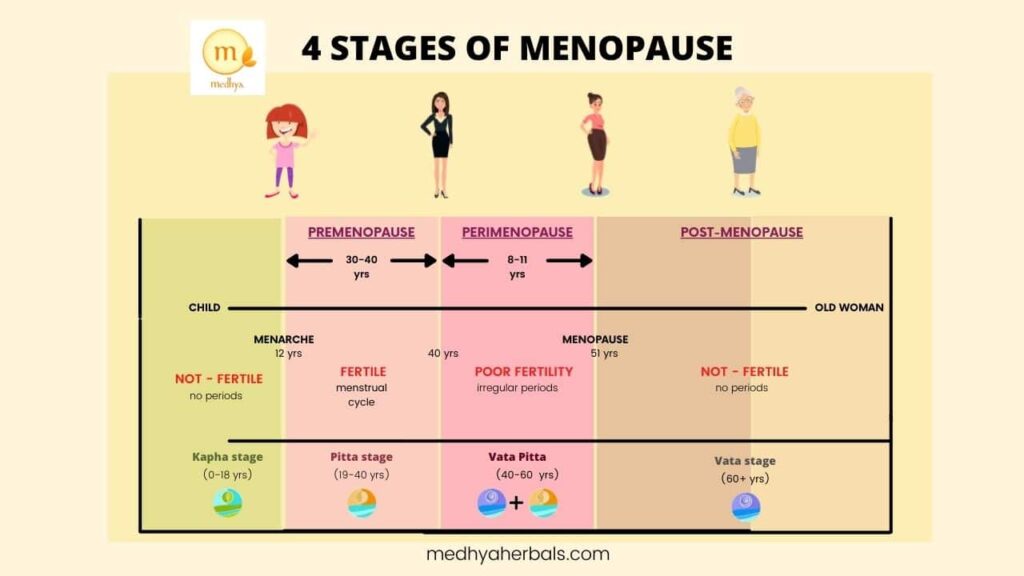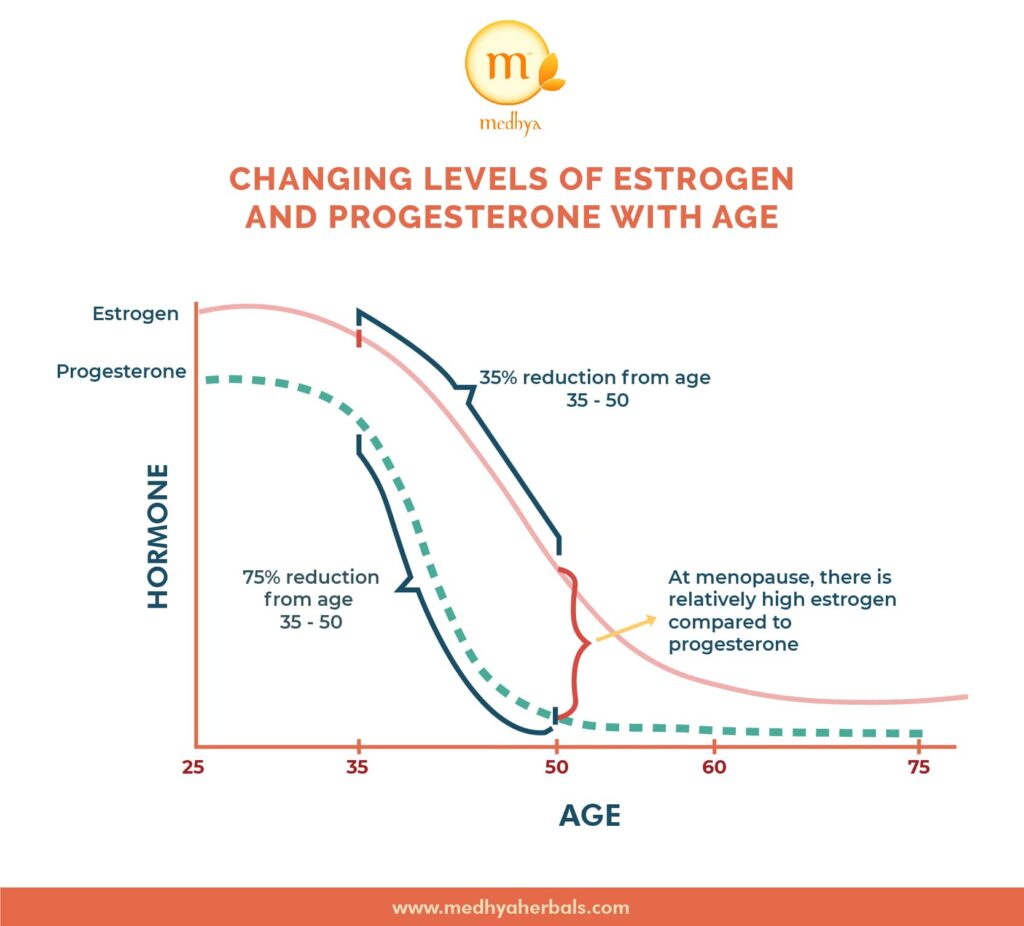Heavy periods and excessive menstrual bleeding in menopause can really make this stage of life, a difficult and uncomfortable phase. While, there are lot of hormonal changes taking place inside your body in your 40s, some of these hormonal changes can really disturb your regular menstrual cycle.
Some women start to experience extremely heavy periods after 40, when perimenopause kicks in and for some, the episodes of heavy menstrual bleeding may well last into their mid 50s or even late 50s.
However, your menopause experience doesn’t need to be like this. Specifically, when there are effective treatments available. Ayurveda, a holistic system of medicine provides with natural treatment options involving herbs, diet and lifestyle changes that can help to balance your hormones and control heavy menstrual bleeding at the root cause levels.
If you are troubled with heavy menstrual bleeding, flooding, spotting in between your periods or prolonged menstrual bleeding during menopause then you will find this post extremely helpful. In this comprehensive guide, we’ll explore the causes, remedies, and important information about heavy periods in menopause. Read on to uncover the secrets to a more comfortable menopausal experience.

Menopause: What to Expect
Before we get to the nitty-gritty of heavy menstrual bleeding in menopause, it’s essential to understand what menopause is all about.
Menopause is a natural biological process that marks the end of a woman’s reproductive years. It usually occurrs between the ages of 45 and 55, with an average age of 51 years. However, the age of onset can vary depending on genetics, lifestyle factors, and overall health.
If we see it on a time line, then menopause is essentially a point when a woman experiences her last period. However, the final stop of menopause doesn’t come easy for a large majority of women. Research states that nearly 80% of the women experience frequent spotting and heavy menstrual bleeding during perimenopause.
The transition to menopause is gradual and can be accompanied by various signs and symptoms, which may vary from one individual to another. Menopause is officially confirmed after 12 consecutive months without a period.

Signs of Perimenopause
Perimenopause is the phase leading up to menopause, and it usually begins in a woman’s mid-to-late 40s and lasts till menopause. During this time, hormone levels, particularly estrogen and progesterone, start to fluctuate, causing various signs and symptoms. Some common signs of perimenopause include:
- Irregular periods: Your menstrual cycle may become unpredictable, with periods occurring more or less frequently than before. In fact, it can be challenging to identify your last period before menopause, as periods may become irregular during perimenopause.
- Changes in menstrual flow: You may experience heavier or lighter periods, sometimes accompanied by blood clots.
- Hot flashes: Sudden sensations of warmth, often in the upper body and face, which can last for a few seconds to several minutes.
- Night sweats: These are hot flashes that occur during sleep, often causing you to wake up drenched in sweat.
- Sleep disturbances: Difficulty falling asleep or staying asleep, often due to night sweats or other discomforts.
- Mood swings: Irritability, anxiety, and depression may become more pronounced during perimenopause.
- Vaginal dryness: Decreased estrogen levels can lead to thinning and dryness of the vaginal tissues, making intercourse uncomfortable or even painful.
- Decreased libido: Fluctuating hormone levels may lead to a decreased interest in sex.
Understanding Heavy Periods in Menopause: Causes and Concerns
While the average age of menopause is 51 years, not everyone experiences it exactly at this age. Usually, women go through a lots of changes in their menstrual cycle after 40. Sometimes, hormonal imbalances and any medical conditions such as PCOS, Endometriosis or Fibroids can get worsen off, which can contribute to heavy periods at 50 and above:
- Hormonal imbalances: Estrogen and progesterone fluctuations during perimenopause can cause the uterine lining to thicken, leading to heavier periods.
- Uterine fibroids: These non-cancerous growths can cause heavy bleeding and pain.
- Uterine Polyps: Benign growths on the uterine lining can also result in increased blood flow.
- Endometrial hyperplasia: Thickening of the uterine lining can lead to heavy bleeding and potentially increase the risk of cancer.
- Pelvic infections and PID can also worsen off the menstrual cycle, thus causing heavy periods or flooding episodes in perimenopause.
- Blood clotting disorders: Conditions such as von Willebrand disease can cause excessive bleeding during menstruation.
- Medical Conditions: For some women, heavy periods can continue even after the age of 50. This can be concerning and may require further medical evaluation to rule out any underlying health issues.
Identifying and Managing Abnormal Menopause Bleeding in Perimenopause
Heavy bleeding during menopause can last for varying lengths of time, depending on the individual. However, if heavy bleeding persists for an extended period such as more than 10 days or occurs after menopause, it’s essential to consult a healthcare professional.
Similarly, passing clots during heavy periods is common and often due to the body’s natural clotting process. However, if clot size or frequency becomes concerning, it’s essential to consult a healthcare professional.
Heavy Menstrual Bleeding: The Red Flags to Watch Out For
When it comes to heavy menstrual bleeding in menopause, there are some telltale signs that something might be amiss. Some of these red flags include:
- Soaking through one or more sanitary pads or tampons every hour for several consecutive hours.
- Bleeding for more than seven days.
- Passing large blood clots.
- Needing to double up on sanitary protection to control flow.
- Experiencing fatigue, shortness of breath, or anemia due to blood loss.
Natural Ways to Control Heavy Bleeding in Perimenopause
Ayurvedic herbal medicines such as Ashoka, Lodhra, Nagakesara, Triphala and Shatavri are highly effective to control heavy menstrual bleeding. In addition, these herbs are excellent sources of micro nutrients and also have medicinal effect on the body.
When used properly, Ayurvedic herbs can help to check the heavy menstrual bleeding and replenish your iron levels too. However, it’s essential to consult with an experienced Ayurvedic doctor before trying any herbal supplements, as they may interact with medications.
Although it’s crucial to consult with a doctor if you experience heavy menstrual bleeding at 50, there are several natural ways to support hormonal balance and regulate your menstrual cycle. Here are some diet and lifestyle practices that you can implement right away to start finding relief:
- Maintain a healthy diet: Eating a well-balanced diet rich in fruits, vegetables, whole grains, lean proteins, and healthy fats can help regulate hormones and improve overall health. Foods high in iron, such as spinach, beans, and lean meats, can help replenish your iron levels during heavy bleeding.
- Stay hydrated: Drinking plenty of water can help reduce bloating and alleviate some of the discomforts associated with heavy periods.
- Exercise regularly: Engaging in regular physical activity can help regulate hormones, reduce stress, and improve overall well-being during menopause. Aim for at least 150 minutes of moderate-intensity exercise per week.
- Practice stress management: High levels of stress can exacerbate heavy bleeding during menopause. Incorporate stress-reducing techniques like meditation, yoga, deep breathing exercises, or engaging in hobbies you enjoy to help manage stress.
- Acupuncture: Some studies suggest that acupuncture may help reduce heavy menstrual bleeding by balancing hormone levels and improving blood circulation. Consider consulting with a licensed acupuncturist to explore this option.
- Use a heating pad: Applying a heating pad to your lower abdomen can help alleviate cramps and discomfort associated with heavy bleeding.
- Maintain a healthy weight: Excess body weight can contribute to hormonal imbalances and heavy bleeding during menopause. Aim to achieve and maintain a healthy weight through a balanced diet and regular exercise.
Takeaway
It’s important to remember that each woman’s experience with menopause is unique. What works for one person may not necessarily work for another. That’s why it is important to focus on your specific health requirements and work with experienced doctors, who can treat your condition in a systematic manner.
Don’t let heavy menstrual bleeding during menopause hold you back from enjoying a healthy, vibrant life. Schedule a consultation with Medhya Herbals’ expert Ayurvedic doctors to get a detailed diagnosis and personalized Ayurvedic natural treatment plan tailored to your unique needs.
Our compassionate and experienced team will guide you through this crucial transition with holistic, natural solutions designed to provide relief and improve your overall well-being. It’s time to embrace the power of Ayurveda and experience the difference it can make in your menopause journey.
Click here to schedule your consultation with Medhya Herbals Ayurvedic Doctors today! Take the first step towards a healthier, happier, and more balanced life.
References
- American College of Obstetricians and Gynecologists – Dysmenorrhea
- Fraser, I. S., Mansour, D., Breymann, C., Hoffman, C., Mezzacasa, A., & Petraglia, F. (2015). Prevalence of heavy menstrual bleeding and experiences of affected women in a European patient survey. International Journal of Gynecology & Obstetrics, 128(3), 196-200.
- Munro, M. G., Critchley, H. O. D., & Fraser, I. S. (2012). The FIGO classification of causes of abnormal uterine bleeding in the reproductive years. Fertility and Sterility, 95(7), 2204-2208.
- Santoro, N., & Komi, J. (2009). Prevalence and impact of vaginal symptoms among postmenopausal women. Journal of Sexual Medicine, 6(8), 2133-2142.
- Shapley, M., Jordan, K., & Croft, P. R. (2004). An epidemiological survey of symptoms of menstrual loss in the community. British Journal of General Practice, 54(502), 359-363.
- Van Voorhis, B. J., Santoro, N., Harlow, S., Crawford, S. L., & Randolph, J. (2008). The relationship of bleeding patterns to daily reproductive hormones in women approaching menopause. Obstetrics and Gynecology, 112(1), 101-108.

